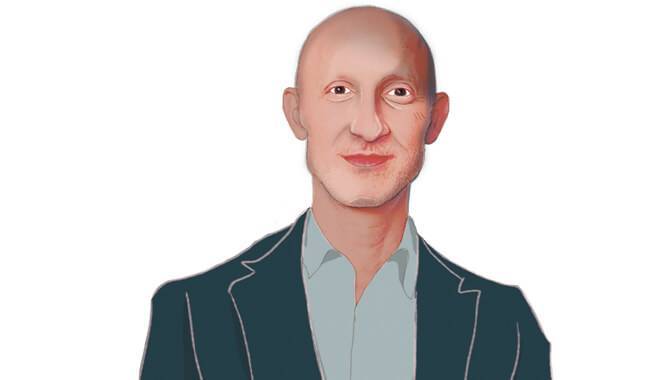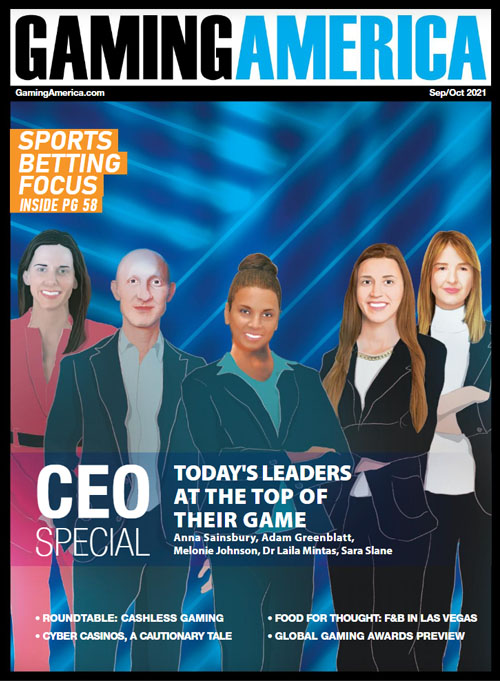
It’s going to take a lot more than some food poisoning to sideline Adam Greenblatt. A business dinner didn’t go down well, but over the course of a 45-minute Zoom call the following morning, he didn’t sit down to rest once. He was ebullient, hydrated, looked fresh and glowed with the enthusiasm and unbridled excitement of a CEO in charge of a company with meteoric results and ambitions. In fact, during parent company MGM Resorts International’s Q2 2021 earnings call in early August, CEO and president Bill Hornbuckle said that JV BetMGM reached a 30% market share in the sports betting and igaming space nationwide in Q2 due in large part to increased customer acquisition and strong retention. Net revenues associated with BetMGM operations also grew 19% sequentially from the first quarter to $194 million in the second.
The BetMGM betting app is integral to that success, of course, which is building momentum after recent launches in Virginia and its latest deployment within Nationals Park in Washington DC. The acute graph of growth is staggering considering that it was only September 2019 where the BetMGM brand was launched in one state and now, with Nats Park, can count 13 jurisdictions.
“We’re delighted with the progress we’re making,” Greenblatt says. “Hundreds of thousands of active players, first-half revenues of $350 million, which is massive sequential growth, and we’re competing for leadership in many of our sports states alongside our number-one position by some margin in gaming so I’m really pleased.”
Of course, a main catalyst for this has been enabled by an overriding acceptance of sports betting becoming part of the mainstream entertainment experience. Betting and sports are no longer mutually exclusive and now a broad range of stakeholders has adopted the reality that it can be harnessed with regulation since it’s going on anyway. Most importantly, the major leagues are behind it now. “What we’ll see this football season is TV advertising during NFL games,” he continues. “This is a first, so how will it change the fan experience? There’s more of a connection between the sports betting and the sports that most Americans have the most affinity for. They’re being connected in a much more visible way. So what does that actually do? It puts a fully-featured sports book in your pocket, millions of betting opportunities covering the widest range of sports you can imagine.”
At the heart of that range is obviously the big four, but it also includes a massive range of international sports made available to an American audience, which not only piques interest but impacts legacy behavior. “Table tennis won much acclaim during Covid, and what we found interesting is that in some of our states, table tennis is our number-five sport,” Greenblatt explains. “So this sample exposure is being borne out and is demonstrable as it’s bringing fandom to some of the more esoteric activities.”
What Greenblatt also understands is that the greater the possibilities for the consumer, the greater the emotional investment. This is where in-play betting is a great leap forward, taking a relatively passive experience and making it what he calls a much more interactive, responsive and real-time engagement. “Suddenly it makes a difference,” he says. “You can have your opinion at stake. Who scores the first points. Is the first half closely contested. All of this enriches the fan experience and since it’s available in a physical retail environment, it makes the viewing experience even more interactive. That creates an exciting, new and real-time dynamic that we’re really leaning into.”
Even though BetMGM is relatively new, and Greenblatt himself has only been in the US for a couple of years from his career journey through his native South Africa and 20 years in London, his ability to balance bottom-line pressures with a flat corporate structure that promotes compassion, empathy and interaction has earned him leadership qualities that were recognized by Glassdoor recently, earning him a top-10 spot in their Employees’ Choice Awards in the SMB category.
“This is one of the most rewarding professional moments of my career,” he admits. “It was beyond what I thought was possible. So for our business to get this kind of recognition, it’s just terrific. We started with no leadership team, no process, no people, no cultural identity, no values framework, but I saw this as more of an opportunity from a blank sheet of paper to distil what I believed to be the most aspirational personal values in a corporate setting. And what we’ve seen now is the synthesis of those things.”
It’s certainly a sign of the times. Greenblatt believes the staff base needs to have a voice and to know there’s a symbiotic relationship, and even co-dependence, with management. Diversity is also a crucial component to not only employ but celebrate so people can be different and accepted. “And of course you overlay that with the values of competition and excellence that are both personal and corporate, and I think that’s what is manifesting now at BetMGM,” Greenblatt affirms. “That’s what this Glassdoor recognition is. It’s a downstream effect of that synthesis.” But the work is just beginning despite getting off to a storied start. He acknowledges that the award is a catalyst, but at the same time, it’s a reality check to see how much better the brand can become.
“It’s both second-guessing if we’re ready for this kind of recognition alongside, ‘Come on guys, we’ve got so much ahead of us. I think we have an opportunity to get better in every department.’ Building on our omni-channel strategy, and with innovation in the app, we have loads of runway ahead of us and so many ideas.” One example he details is the inherited framework of predictive models through one of their shareholders, Entain, that says what a player is going to do next and how to help them achieve the best experience. “Those predictive models become ever more powerful,” he says. “The more information you have, the more data you have to train the model. And we only really have since September 2019 a base of meaningful data. So the degree to which we can continue to improve and refine these predictive models and operationalize those models has enormous value potential for BetMGM.”
And on the other side, away from product operations, embedding and supporting employee resource groups, and refining internal communication processes and transitioning into a hybrid model where everyone feels included, are other key priorities. Those structures are formed, but really bringing them to life and supercharging them is essential. “These remain the core challenges and opportunities for us to get better,” he adds. “And it goes without saying that we have another 30 states to roll out into.” But a reliance on transparency, empathy and agility as core values makes for a healthy bedrock, especially considering where’s it’s gotten Greenblatt and his team so far.
“Today’s younger people have different expectations and desires,” he says. “They seek different meaning from their work and how they apply their time. And I think there’s a need for leadership authenticity and diversity. So by exhibiting empathy and communicating in a transparent way, you know where you stand. And as we invest discretionary effort into each other, we build a foundation of trust, which creates a halo effect that is very powerful. How we show up for the people we share our lives with speaks of who we are, individually and as a business, and I think this has been critical to the diffusion of culture given that we’ve grown our headcount during Covid 400%.”
Getting that headcount is a process of finding out more about what kind of person you are rather than direct experience in the industry, or hitting a certain number. There has to be a common understanding of purpose. For Greenblatt, it’s also a process of recognizing what you don’t want in the organization. “I had a clear idea coming into this leadership role of what to avoid in a professional context that I didn’t want to replicate,” he explains. “I’ve seen the impact of siloed, top-down communication, which over time is very divisive to a management team. And to have multiple and separate conversations is also very inefficient. I’ve seen the impact of internal politics resulting in a low trust environment, which reduces the willingness to take healthy risks at every level in the business. We have to take calculated, data-driven risks in order to move forward, break ground and innovate. I feel like I’ve been led by the values I was brought up with: respect for individuals at every level. Coming from South Africa where there’s a big income disparity, the model that was set for me was to always be respectful and fair, and that a person isn’t judged by their station.”
He also references a pivotal time when he was working on a forensic investigation in Brunei for accounting firm Arthur Andersen, and was part of what he calls the highest performing team he was ever a part of. It was a small group but high talent, low ego and high trust, and the outcome was tremendously successful. “It was these qualities of that team that I look back on and offer as features of team and culture that create high performing results,” he says. So during the interview process for new talent, he’ll also ask about long-lasting relationships: can you maintain a relationship over a long period? “Because to maintain a long relationship, you need to show up when you say you are, and you need to be honest and trustworthy,” he says. “If those two things can come together, there is at least the recipe for greatness and longevity.”
This is where all the concepts meld for Greenblatt. “In order for the business to be in lockstep with corporate values, there’s no alternative for the leadership team but walk the walk,” he says. “Here, the leadership team spends time together every day and that’s very helpful in making sure we don’t fracture and that we keep together so the energy we have as a team and a business is maintained. We’re high-touch all the way through the business and we think it’s good for the business, and the results that are being driven by the halo effect of this positive sentiment toward the business are self evident.” So in short, Greenblatt’s Glassdoor is always open.

